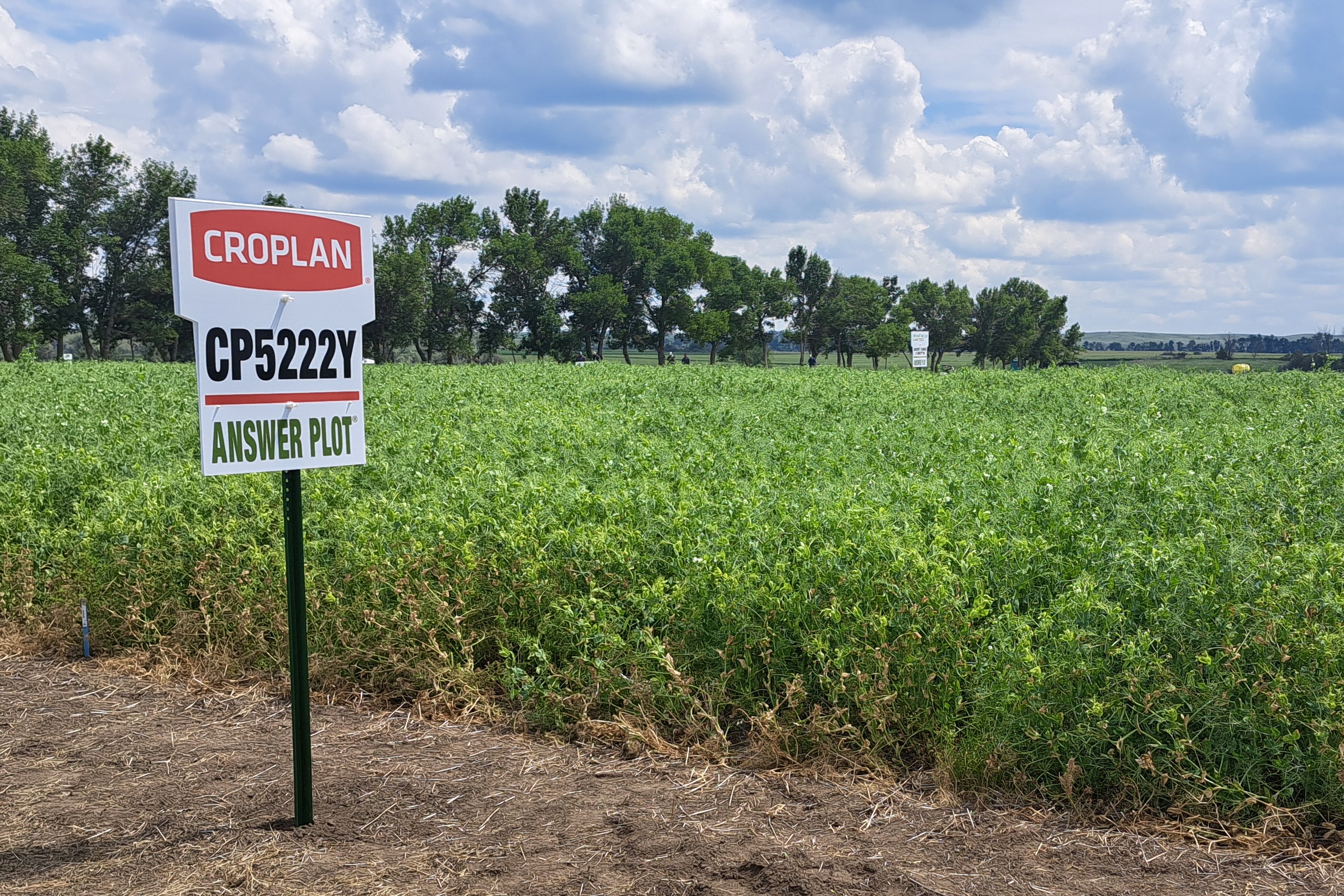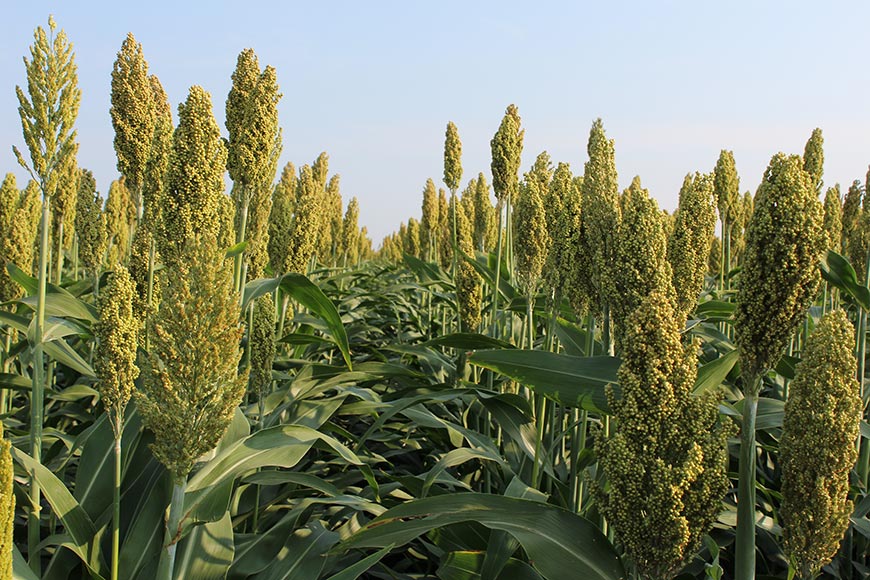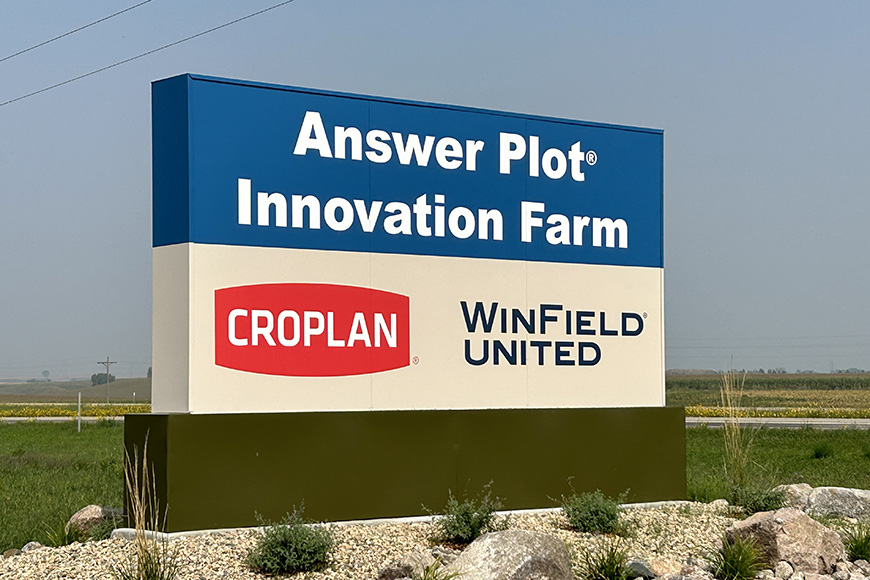Sep 24, 2025
2025 Innovation Tour Showcases Crop Diversity in Action
Carla Snider
Senior Product Manager

On July 16, nearly 200 farmers, retailers and industry representatives gathered at the Answer Plot® Innovation Farm in Washburn, North Dakota, for the annual Answer Plot Innovation Tour. Now in its third year, this event allows us to showcase our research focused exclusively on diverse crops, including spring wheat, canola, sunflowers and alfalfa. It’s also an opportunity for our team to share data and insights to support farmers who are interested in diversification to adapt to shifting environmental, agronomic and financial challenges.
Visitors are often struck by the scale of the Innovation Farm, the attention to detail and the overall “wow” factor, not to mention the focus on diverse crops you’d be hard pressed to find elsewhere. This time around was no exception. Thanks to months of preparation by our Answer Plot crew and the CROPLAN® seed diversified field crop (DFC) team, the farm was in excellent condition, with the plots ready to help deliver insights to growers.
If you’re growing a diversified crop or considering adding them to your operation, here are a couple of takeaways for those who couldn’t join us this summer.
This location also serves as a testing ground for top genetic suppliers, allowing us to bring traits and genetics into the U.S., assess performance and introduce greater diversity into the market.
Our location was chosen because it sits in the heart of sunflower, canola and wheat country. These are the three dominant crops in the area and the focus of most of our replicated research. More recently, we’ve expanded into pulse crops, like field peas and lentils, and we have just begun work with garbanzo beans.

At events like the Innovation Tour, people may come expecting just a tour. While our replicated research areas are used for data collection, our demo plots are designed for hands-on interaction. Visitors can walk through, touch, dig up and pull plants. Our team also makes sure the plots, demonstrations and datasets are designed to give a clear picture of what works and why. Together, these elements make the farm a unique place to evaluate crops in the field and help tie those observations to performance potential.
We recommend taking a 360-degree crop management approach. This emphasizes not just crop variety but also the benefits of keeping a crop growing throughout the year. After the primary cash crop harvest, you can plant additional crops to create a continuous growth and harvest cycle. Think of it as making use of every available growing day to generate value, whether that means forage, grain or a combination.
A diversified crop plan can be a strong fit for livestock producers, such as cow-calf operations. Integrating forage crops like alfalfa, triticale and sorghum not only helps mitigate weeds, pests and diseases but also supports soil health and provides on-farm forage. With today’s cattle prices, many producers are looking for ways to grow extra feed rather than leave land fallow, turning idle acres between crops into productive forage sources. These rotations also offer a place to apply manure, giving livestock operations an outlet.
If you have questions about diversified crops or would like to learn more about our next Answer Plot Innovation Farm event, consult your CROPLAN local retail seed expert. They can help you customize a plan to fit your operation.
All photos are either the property of WinField United or used with permission.
© 2025 WinField United. Important: Before use always read and follow label instructions. Crop performance is dependent on several factors many of which are beyond the control of WinField United, including without limitation, soil type, pest pressures, agronomic practices and weather conditions. Growers are encouraged to consider data from multiple locations, over multiple years and to be mindful of how such agronomic conditions could impact results. Answer Plot and CROPLAN are trademarks of WinField United.
Visitors are often struck by the scale of the Innovation Farm, the attention to detail and the overall “wow” factor, not to mention the focus on diverse crops you’d be hard pressed to find elsewhere. This time around was no exception. Thanks to months of preparation by our Answer Plot crew and the CROPLAN® seed diversified field crop (DFC) team, the farm was in excellent condition, with the plots ready to help deliver insights to growers.
If you’re growing a diversified crop or considering adding them to your operation, here are a couple of takeaways for those who couldn’t join us this summer.
What’s New at the Innovation Farm
Since 2022, we’ve transformed 162 acres into a fully functioning site that’s the centerpiece of our DFC research — built with growers in mind. In today’s market, where crop choices often shift year to year based on profitability, the farm allows growers to see a wide range of crops, understand their potential and leave with the knowledge needed to make the most of every acre.This location also serves as a testing ground for top genetic suppliers, allowing us to bring traits and genetics into the U.S., assess performance and introduce greater diversity into the market.
Our location was chosen because it sits in the heart of sunflower, canola and wheat country. These are the three dominant crops in the area and the focus of most of our replicated research. More recently, we’ve expanded into pulse crops, like field peas and lentils, and we have just begun work with garbanzo beans.

At events like the Innovation Tour, people may come expecting just a tour. While our replicated research areas are used for data collection, our demo plots are designed for hands-on interaction. Visitors can walk through, touch, dig up and pull plants. Our team also makes sure the plots, demonstrations and datasets are designed to give a clear picture of what works and why. Together, these elements make the farm a unique place to evaluate crops in the field and help tie those observations to performance potential.
Diversifying Your Crop Plan
Diversification remains a hot topic of discussion among growers, and events like these give visitors the chance to see diverse crops in action and learn how they might fit into their operations.We recommend taking a 360-degree crop management approach. This emphasizes not just crop variety but also the benefits of keeping a crop growing throughout the year. After the primary cash crop harvest, you can plant additional crops to create a continuous growth and harvest cycle. Think of it as making use of every available growing day to generate value, whether that means forage, grain or a combination.
Benefits of a 360-Degree Approach
While the details vary by region and farm, there are several ways a more diverse crop portfolio can add value. First, diversification helps spread risk across multiple crops throughout the year. It also creates opportunities to help improve profitability potential by capitalizing on unique market trends. For example, the canola market may be strong in your area.A diversified crop plan can be a strong fit for livestock producers, such as cow-calf operations. Integrating forage crops like alfalfa, triticale and sorghum not only helps mitigate weeds, pests and diseases but also supports soil health and provides on-farm forage. With today’s cattle prices, many producers are looking for ways to grow extra feed rather than leave land fallow, turning idle acres between crops into productive forage sources. These rotations also offer a place to apply manure, giving livestock operations an outlet.
If you have questions about diversified crops or would like to learn more about our next Answer Plot Innovation Farm event, consult your CROPLAN local retail seed expert. They can help you customize a plan to fit your operation.
All photos are either the property of WinField United or used with permission.
© 2025 WinField United. Important: Before use always read and follow label instructions. Crop performance is dependent on several factors many of which are beyond the control of WinField United, including without limitation, soil type, pest pressures, agronomic practices and weather conditions. Growers are encouraged to consider data from multiple locations, over multiple years and to be mindful of how such agronomic conditions could impact results. Answer Plot and CROPLAN are trademarks of WinField United.
IF YOU LOVE OUR INSIGHT, YOU’LL LOVE OUR ROI POTENTIAL
Every successful harvest starts with a seed. It just can't end there. Choose which high-performing seed products you’ll start with this season.






